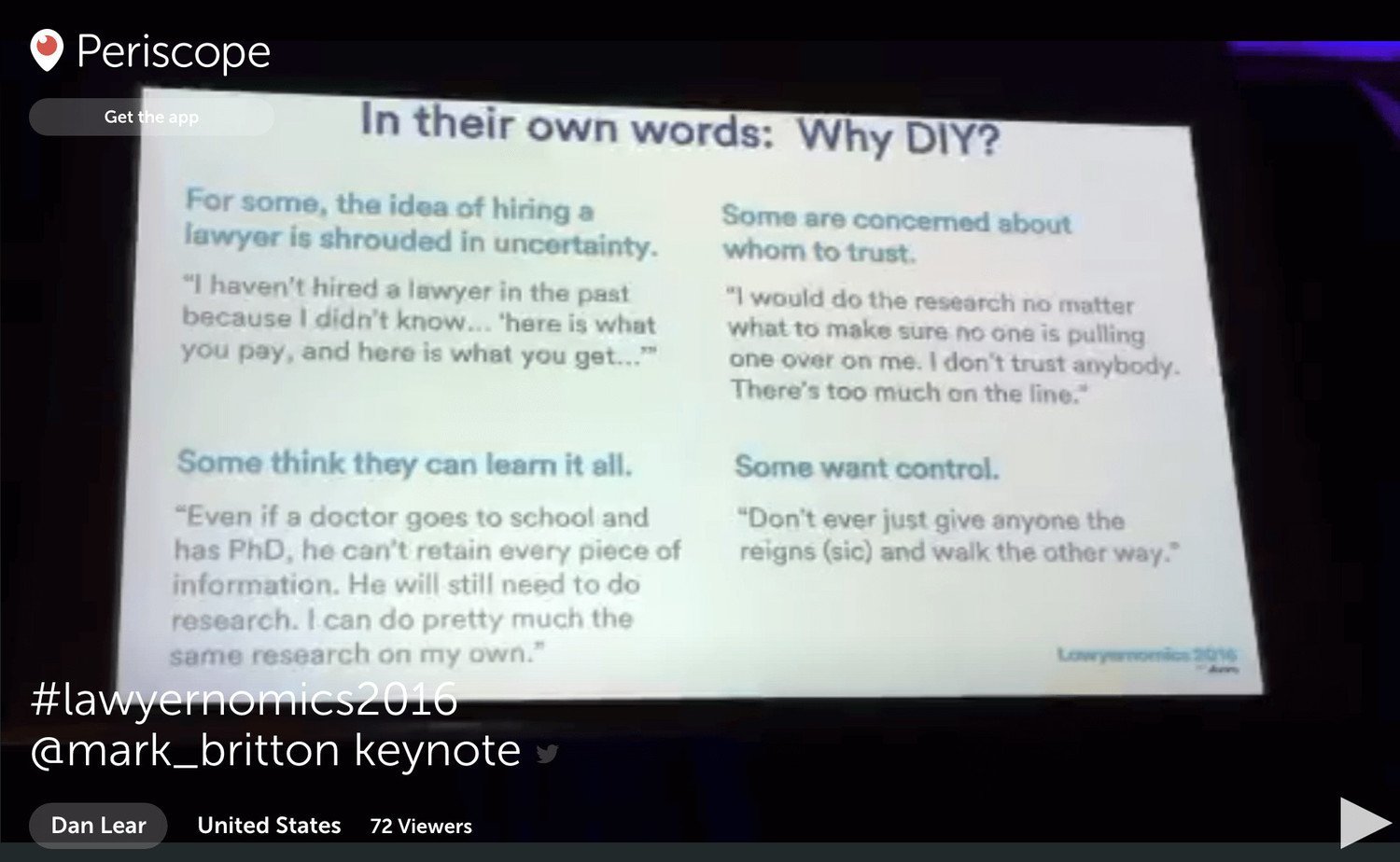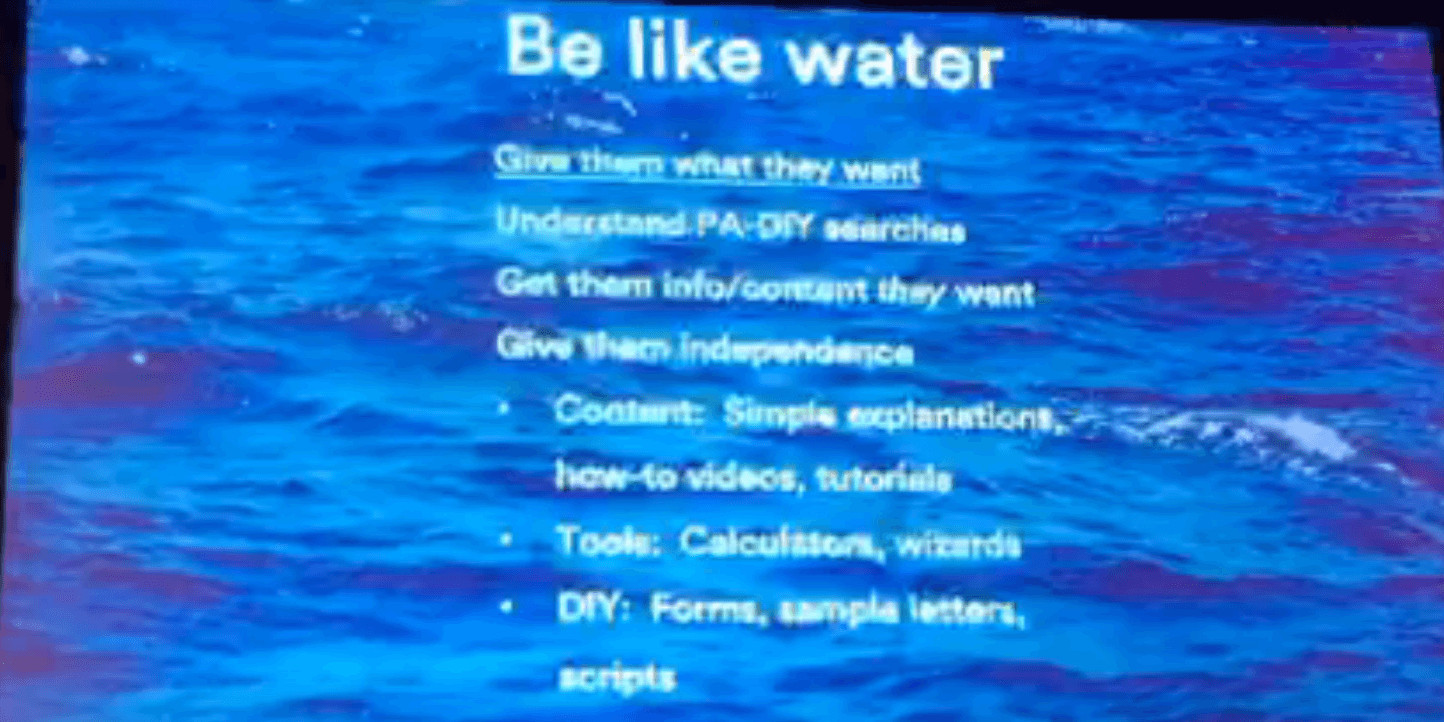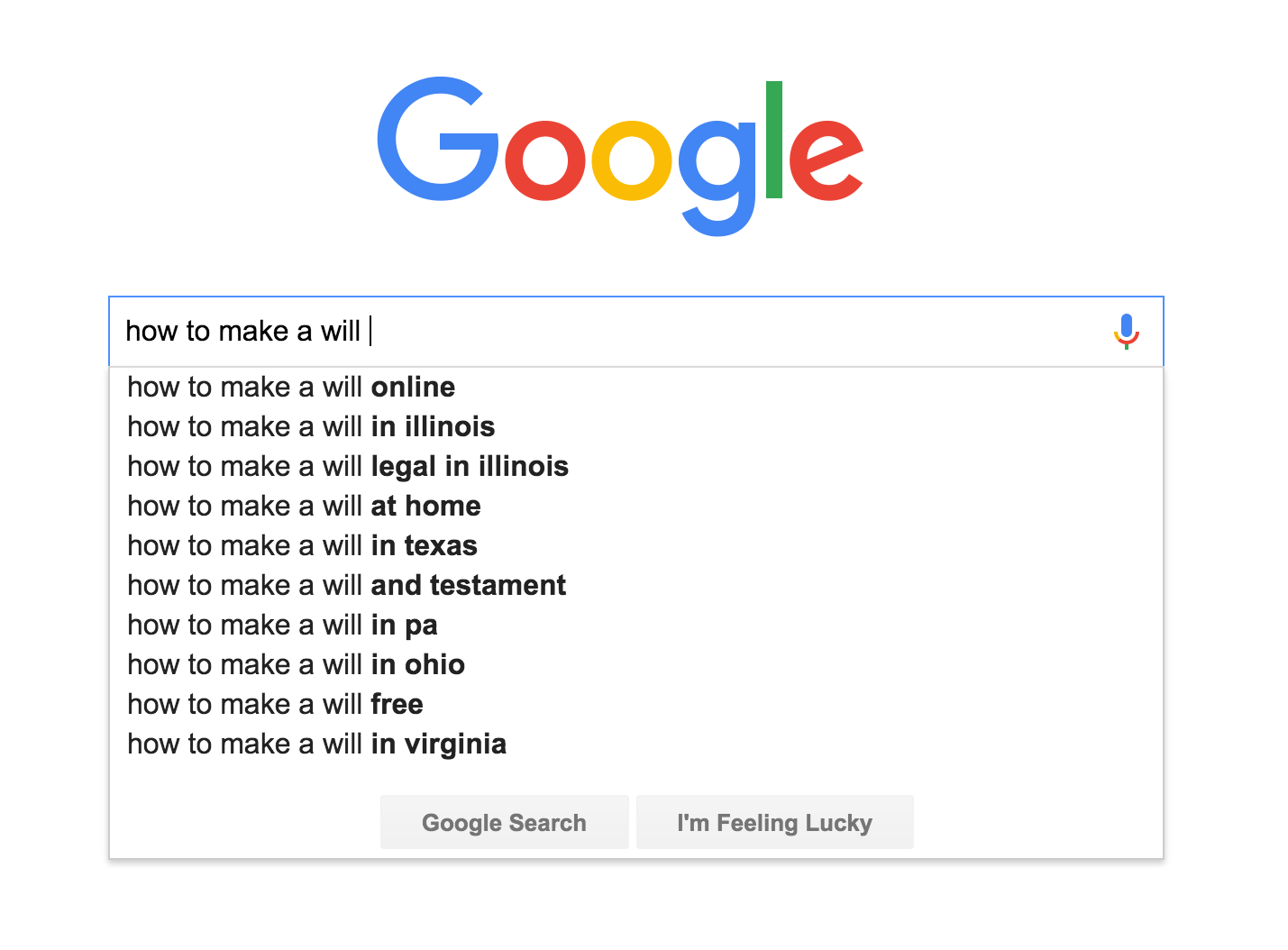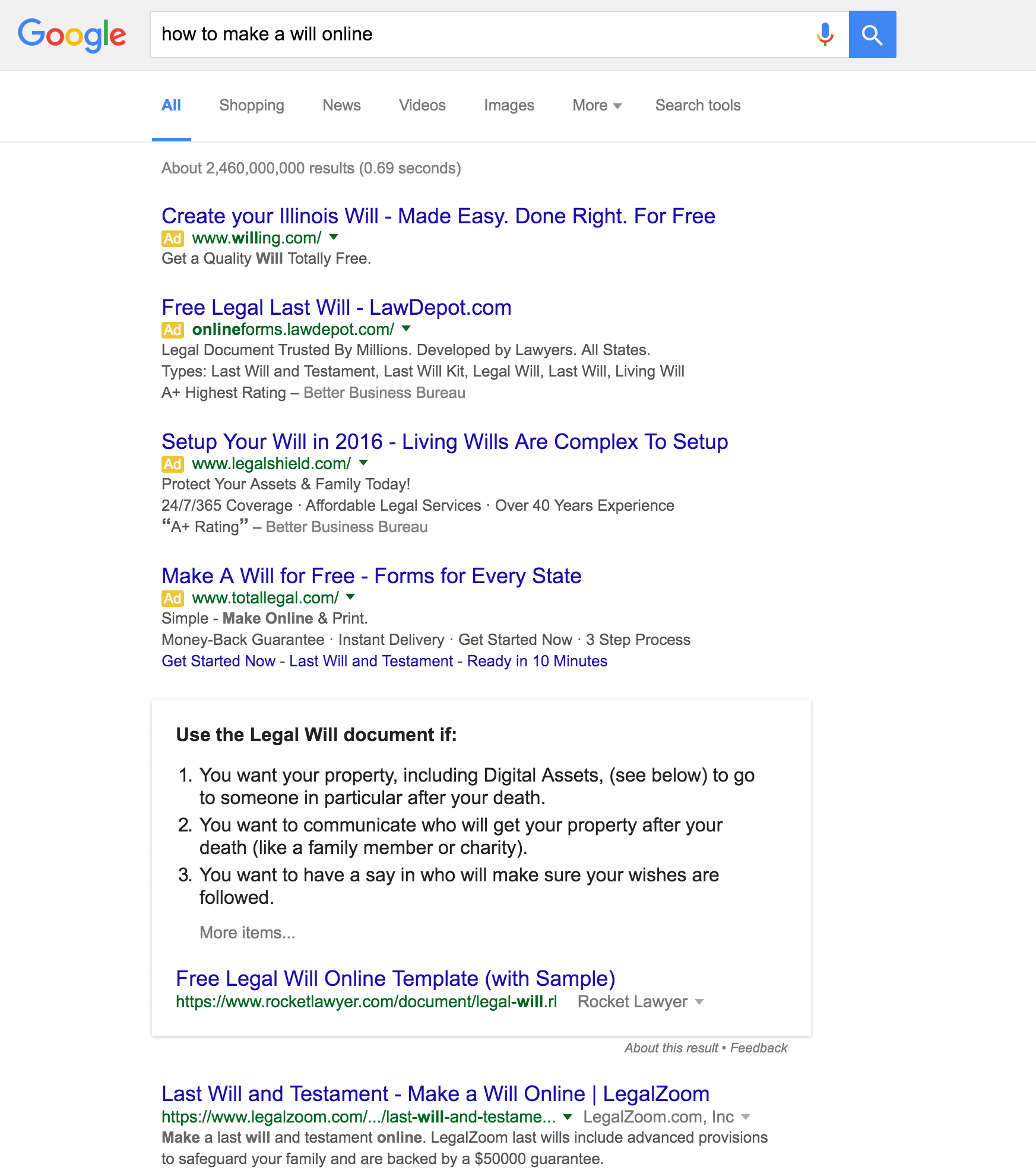A man who is his own lawyer has a fool for his client.
- Proverb
When many lawyers hear things like do-it-yourself legal forms, online legal tools and online legal question and answers they immediately cry: Harm!
And there's little doubt that legal services consumers, like consumers of other professional services, who rely solely on information on the internet, are likely to exacerbate their issues.
Does that mean that lawyers should boycott the internet? Should they ignore the demand for online information and answers? Of course not.
Since our founding in 2008, we've been thinking and writing about how legal services consumers use the internet. Back in 2010 we briefly discussed two common ways in which consumers used the internet to perform research and look for law firms.
We've also discussed how lawyers can learn about attracting potential clients from their local search behavior. Lawyers who add information to their sites that other people find useful and trustworthy will continue to enjoy an online competitive advantage over those who do not.
And we continue to observe how the behavior of legal services consumers evolves with technology.
No matter who your clients are and how they begin their lawyer decision-making process, at some point, for some purposes, they’re going to go online.
Avvo recently wrapped their annual Lawyernomics conference. Unfortunately, I was unable to attend this year. Thankfully, through the magic of Twitter, Periscope and Dan Lear (@rightbrainlaw), I was able to follow some of what was going on from afar.
Of particular interest to me was Avvo CEO Mark Britton's (@Mark_Britton) State of the Union. Over the years, I have had the good fortune to get to know Mark and, from my perspective, there are very few people who understand the legal landscape as well as he does.
Hopefully, by now it is clear to you that people turn to the internet for information and answers about legal issues. But just in case:
Don't think people turn to the internet for answers about legal questions? #lawyernomcs pic.twitter.com/Sn696HweGF
— AttorneySync (@AttorneySync) April 10, 2016
If you're a lawyer who still questions the relevance of the web to your potential clients, I wish you luck.
To me, the real question is not whether, but rather, how lawyers ought to respond to this demand for information online.
Not Your Parents' Do-It-Yourself
As discussed above, lawyers think of legal do-it-yourself'ers as fools. Undoubtedly, there are limitless examples of this proverb holding true. But let's face it, lawyers also have a thumb in this war. If people could solve all of their legal issues on their own, well, there would be a lot less lawyers.
But there are also some sets of circumstances in which hiring a lawyer might not be the right move.
Regardless, the overwhelming majority of life issues that might eventually give rise to the need for a lawyer start with questions that have nothing to do with looking for a lawyer.
The truth is, most people have no idea whether they need a lawyer until they are told so. And then, even when they suspect that they might, there are a variety of reasons that make them reluctant to hire one.

Furthermore, there's at least some misunderstanding of what do-it-yourself really means. Traditional concepts of d-i-y tend to be binary:
The very definition of do-it-yourself legal means without a lawyer.
But from the perspective of a legal services consumer, this isn't always the case:
"56% of people say immediate discussion with a lawyer is the most valuable legal self help too." - @Mark_Britton #Lawyernomics
— Avvo Lawyers (@AvvoLawyers) April 9, 2016
85% of people who complete a form online want to talk to a lawyer. #Lawyernomics
— John Skiba (@JohnSkiba) April 9, 2016
You see, in the digital age, people have been empowered to exercise much more autonomy over their lives. However, they are still able to recognize that there are limitations to self-help and advantages to professional help.
Genetically Cheap, Pain Adverse
If you think it's expensive to hire a professional to do the job, wait until you hire an amateur.
- commonly attributed to Red Adair
Many people don't hire a lawyer because they don't think that they can afford it. Others, who might recognize that they need a lawyer, will begin their search based on price.
However, even the most "genetically cheap" among us are also adverse to pain.
Often times the challenge is that we aren't very good at conceptualizing the potential pain that can result from choosing cheap.
This is where smart lawyers have an opportunity to communicate the value of their services.
Give Them What They Want, "Sell" Them What They Really Need
Britton suggests that lawyers give legal services consumers what they want:
.@Mark_Britton: Give consumers what they want. Understand PA-DIY searches, give them info, content, tools, forms, etc. #lawyernomics.
— Victor Li (@LawScribbler) April 9, 2016
.@Mark_Britton: Then give 'em what they really want. Get them talking, let them know you’re standing by, offer contact options #lawyernomics
— Victor Li (@LawScribbler) April 9, 2016

In other words, lawyers ought to supply do-it-yourself'ers' demand for information, and at the same time, help them understand the risks and costs associated with declining professional help.
By fostering legal services consumers' independence in seeking answers, lawyers can build trust and help consumers draw their own conclusion that they actually need the lawyer's help.
Start a Conversation
Furthermore, lawyers ought to make interfacing with potential clients frictionless. For many lawyers, this presents significant challenges.
Too many lawyers seem to believe that creating contact barriers is essential to their ability to get work done. Sadly, these barriers lead to the most common complaints that people make against lawyers: lack of responsiveness, lack of communication, failing to keep clients informed, etc.
Instead, lawyers ought to encourage legal services consumers to start a conversation with them.
Does that mean posting: Free Legal Advice everywhere you can?
Of course not. What it does mean is that lawyers should communicate how they can be contacted. They should set expectations about communication. They should build intake systems that help qualify whether or not they would be a good fit for the potential client. They should be explaining:
Who they help. How they can help.
How to Get Started
If all of this is new to you, I encourage you to start by listening to people. If you have them, listen to your existing clients. Ask them how they looked for information about the issues they were facing. Ask them what types of things they found most appealing about you.
What messaging @AvvoLawyers has learned is appealing (or not) to prospective clients. #Lawyernomics2016 pic.twitter.com/PjnAaG33w2
— John E. Grant (@JEGrant3) April 9, 2016
You should also listen to what people are asking online. Look at your Search Console data:
Search Console data, great way to find what people are searching. pic.twitter.com/34QKQxk6qR
— AttorneySync (@AttorneySync) April 10, 2016
Filter query data containing questions words like:
You can also use Google autocomplete and related searches to get a sense of what types of searches people perform:

Once you understand how legal services consumers are searching for information, you can explore ways to supply that demand:

Of course, you should also explain the risks and costs associated with making certain decisions. For example, the advantages of working with a lawyer, as opposed to, trying to do-it-yourself.
You should also learn something about how the web, social networks and search engines work. For example:
Of course, you can also hire people to help...
Finally, if you'd like to learn more about bringing your law firm website into the twenty-first century, join us for this upcoming webinar:
Webinar: How to Make Your Law Firm Website Mobile-Friendly, SEO-Optimized, and Accessible...
Posted by AttorneySync: Online Legal Marketing on Thursday, April 7, 2016

Here's a recent Google SERP for "𝘄𝗵𝗼 𝗮𝗿𝗲 𝘁𝗵𝗲 𝗯𝗲𝘀𝘁 𝗰𝗮𝗿 𝗮𝗰𝗰𝗶𝗱𝗲𝗻𝘁 𝗹𝗮𝘄𝘆𝗲𝗿𝘀 𝗶𝗻 𝗽𝗵𝗶𝗹𝗮𝗱𝗲𝗹𝗽𝗵𝗶𝗮." Ads? ❌LSAs? ❌Local Pack? ❌Links? ❌ 🔷 AI Overview? ✅ 6 firms listed. Only one tiny 🔗. Click the 𝗦𝗵𝗼𝘄 𝗺𝗼𝗿𝗲 button? 𝗬𝗼𝘂 𝗴𝗲𝘁: Here's a more detailed look at some of these firms: THE PEARCE LAW FIRM, P.C.Edith Pearce, […]
On April 22, 2025, Google sent an email updating Local Services Ads Additional Terms for Providers: Subject: Action required: important updates to Local Service Ads Additional Terms Many people are arguing that lawyers cannot participate in Local Services Ads, as this would constitute a per se violation of the Rules of Professional Conduct related to […]
Conrad and I recently joined Zack at Lawyerist to record a conversation about AI and marketing. You might think that we spend the whole time on how lawyers can use AI to publish content. You'd be wrong. While AI can certainly support publishing, there are many more interesting ways to use it in legal marketing. […]
As more legal services consumers turn to ChatGPT for local law firm recommendations, a fascinating intersection between AI, search, and maps unfolds. While Google remains the undisputed leader in local business data, ChatGPT is increasingly becoming an entry point for searchers seeking legal representation. But here’s the kicker: instead of keeping users within its ecosystem, […]
When law firms contact us, they usually want to talk: • PPC Ads • SEO Rankings • Lead Generation Very few want to talk: • Brand • Trust & Recognition • Emotional Connection Admittedly, much of this concerns that AttorneySync is known for lead generation across those common digital channels. But even when we start […]
According to an October 2024 study by SE Ranking: "The legal niche triggers the highest percentage of AIOs (77.67%). The average number of links matched between the AI Overview resources and the top 20 search results was 6.49 for legal topics. AI Overviews for legal topics most frequently link to NYCourts.gov (114 links), YouTube.com (48 […]
I'm grateful for my friend, Charley Mann of Law firm Alchemy. If you're a lawyer, subscribe to his Free Email List. In a recent email, Charley calls out bad guru advice on hiring: "Trying to execute a major SEO improvement? You need to find people who will help you, instead of trying to DIY it […]
If you’ve spent any time on LinkedIn, you’ve likely seen posts from law firm SEO experts showing off charts with an “up and to the right” trajectory. These screenshots, often pulled from tools like Semrush or Ahrefs, are meant to signal SEO success. And it’s not just the agencies celebrating—𝗹𝗮𝘄 𝗳𝗶𝗿𝗺𝘀 𝘁𝗵𝗮𝘁 𝗵𝗮𝘃𝗲 𝗵𝗶𝗿𝗲𝗱 𝘁𝗵𝗲𝗺 […]
Meh, links! All things being equal, links still tend to move the dial more than any other factor in legal SERPs. Maybe links are having a diminishing impact internet-wide. But in my experience, quality links, especially relevant links (both topically and geographically), tend to improve law firm visibility in search more than most everything else. […]